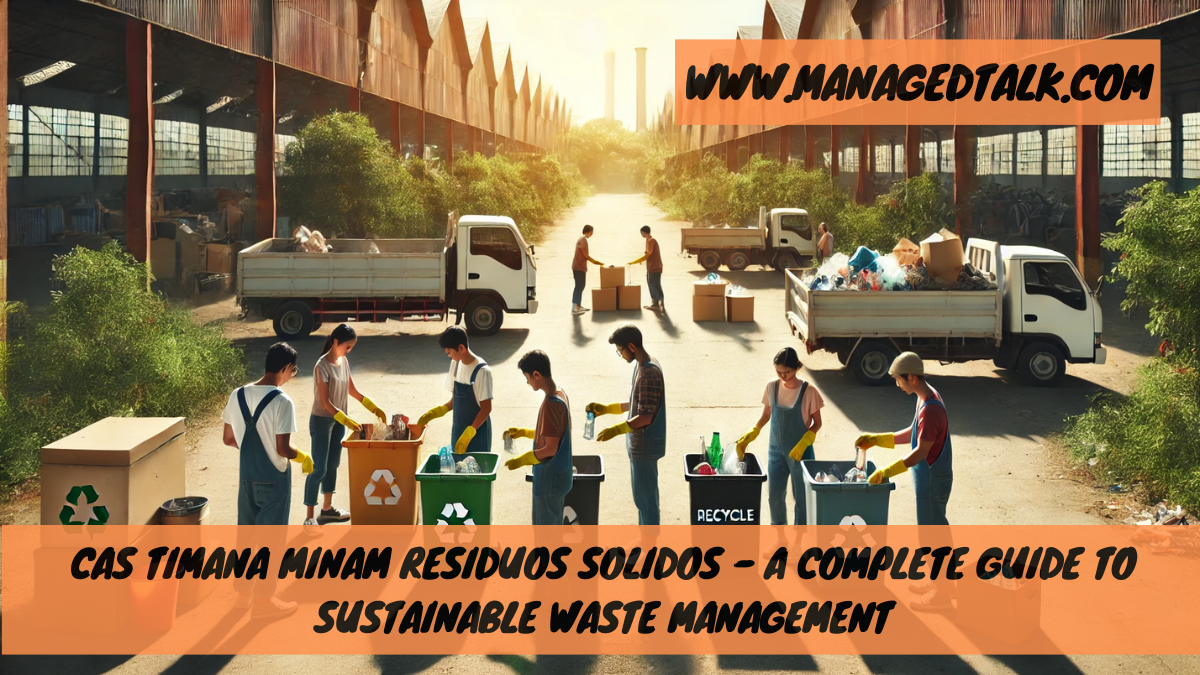Introduction: Understanding “Cas Timana Minam Residuos Solidos”
“Cas Timana Minam Residuos Solidos” refers to solid waste management initiatives led by the Ministry of Environment (Minam) aimed at promoting sustainable practices for waste reduction, recycling, and responsible disposal. These initiatives align with global efforts to combat pollution, protect ecosystems, and foster community involvement in waste management. This article will explore various aspects of these initiatives, including their purpose, implementation, and long-term impact.
1. What Is Solid Waste Management?
Solid waste management involves collecting, treating, and disposing of solid materials that no longer serve their original purpose. Effective management prevents waste from becoming hazardous to the environment and human health. Here’s why it matters:
- Prevention of Pollution: Proper disposal reduces contamination of air, water, and soil.
- Resource Conservation: Recycling recovers valuable materials.
- Economic Benefits: Reduces disposal costs and supports green jobs.
2. The Importance of “Cas Timana Minam Residuos Solidos” Initiatives
The “Cas Timana Minam Residuos Solidos” program plays a critical role in educating communities about waste separation and responsible disposal. Its benefits include:
- Enhanced Public Awareness: Informing people on the dangers of improper waste management.
- Community Engagement: Involving local groups in sustainable practices.
- Environmental Protection: Reducing landfill overflow and pollution.
These initiatives encourage communities to implement waste reduction strategies that are easy to follow and maintain.
3. Key Components of the Program
The program emphasizes three main pillars:
- Education and Outreach: Workshops and educational campaigns to inform communities about waste segregation.
- Infrastructure Development: Providing bins, recycling centers, and waste collection vehicles.
- Policy Enforcement: Regulations to ensure adherence to waste management practices.
SEO Tip: When talking about “cas timana minam residuos solidos,” relate it to broader environmental terms such as “waste disposal policies” and “green initiatives.”
4. Strategies for Effective Waste Management
Understanding and adopting effective strategies can improve compliance with waste management programs:
- Source Reduction: Minimizing waste creation at its source through reduced consumption and packaging.
- Recycling and Composting: Transforming waste into reusable materials or organic compost.
- Waste-to-Energy Conversion: Using technology to convert non-recyclable waste into energy.
5. Challenges Faced by Solid Waste Management Programs
Implementing solid waste management systems like “Cas Timana Minam Residuos Solidos” comes with its challenges:
- Lack of Infrastructure: Some regions may lack the necessary facilities.
- Public Compliance: Educating and persuading people to adopt sustainable habits.
- Funding: Securing adequate financial support for long-term success.
6. Best Practices for Households and Communities
To complement initiatives like “Cas Timana Minam Residuos Solidos,” individuals can adopt practices to manage waste effectively:
- Sort Waste Properly: Separate organic waste, recyclables, and non-recyclables.
- Educate Family Members: Teach children about sustainability.
- Community Participation: Join local clean-up drives and recycling programs.
SEO-Friendly Tip: Use terms like “eco-friendly waste disposal,” “home recycling tips,” and “community waste programs.”
7. Case Studies: Success Stories of “Cas Timana Minam Residuos Solidos”
Highlighting successful examples can offer inspiration and prove the effectiveness of these initiatives:
- Urban Pilot Projects: Cities that have implemented these programs have seen significant reductions in waste.
- Community Testimonials: Personal stories from residents who witnessed improved conditions after participating.
8. Impact Analysis and Future Outlook
Cas Timana Minam Residuos Solidos initiatives have demonstrated tangible benefits:
- Environmental Impact: Decreased pollution levels and improved public health.
- Economic Benefits: Job creation in recycling and waste management sectors.
- Long-term Sustainability: Encourages a shift toward more eco-conscious lifestyles.
Future plans involve scaling up these programs and introducing innovative solutions such as smart bins and AI-assisted sorting technologies.
9. FAQs About “Cas Timana Minam Residuos Solidos”
- What is the main goal of the “Cas Timana Minam Residuos Solidos” initiative? Its primary goal is to reduce environmental pollution through effective solid waste management practices.
- How can individuals contribute to these efforts? Individuals can sort waste at home, participate in community programs, and stay informed about sustainable practices.
- What are the main challenges to waste management? Infrastructure limitations, public awareness, and funding are significant challenges.
Conclusion: A Call to Action
Participation in programs like “Cas Timana Minam Residuos Solidos” is crucial for sustainable development. By understanding, supporting, and engaging with these efforts, communities can protect their environment and contribute to global sustainability goals.
